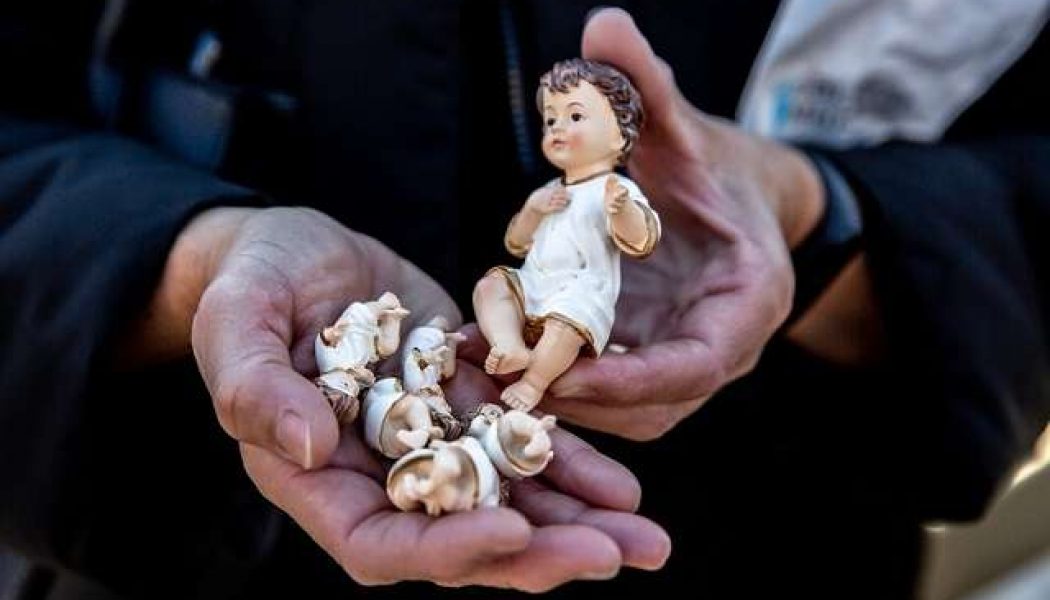.- Arriving at Christian joy is no cakewalk, but if we put Jesus at the center of our lives, it is possible to have a joyful faith, Pope Francis said on Sunday.
“The invitation to joy is characteristic of the season of Advent,” the pope said in his Angelus address Dec. 13. “This is joy: to point to Jesus.”
He reflected on the day’s Gospel reading from St. John, and encouraged people to follow the example of St. John the Baptist — in his joy and in his testimony to the coming of Jesus Christ.
St. John the Baptist “undertook a long journey to come to bear witness to Jesus,” he pointed out. “The journey of joy is not a walk in the park. It takes work to always be joyful.”
“John left everything, from a young age, to put God first, to listen to his Word with all his heart and all his strength,” he continued. “He withdrew into the desert stripping himself of everything superfluous, to be freer to follow the wind of the Holy Spirit.”
Speaking from a window overlooking St. Peter’s Square, Pope Francis encouraged Catholics to use the occasion of the Third Sunday of Advent, also called Gaudete (Rejoice) Sunday, to reflect on whether they live their faith joyfully, and whether they convey the joy of being a Christian to others.
He lamented that too many Christians look like they are attending a funeral wake. But we have so many reasons to rejoice, he said: “Christ is risen! Christ loves you!”
According to Francis, the first condition necessary for Christian joy is to focus less on one’s self and to put Jesus at the center of everything.
This is not about “alienation” from life, he said, because Jesus “is the light that gives full meaning to the life of every man and woman who comes into this world.”
“It is the same dynamism of love, which leads me to come out of myself not to lose myself, but to find myself while I give myself, while I seek the good of the other,” he explained.
St. John the Baptist is a good example of this, the pope said. As the first witness of Jesus, he achieved his mission not by drawing attention to himself, but by always pointing to “the One who was to come.”
“He was always pointing out the Lord,” Francis emphasized. “Like Our Lady: always pointing out the Lord: ‘Do what He tells you.’ Always the Lord at the center. The saints around, pointing out the Lord.” He added: “And whoever does not point out the Lord is not holy!”
“In particular, [John] the Baptist is a model for those in the Church who are called to proclaim Christ to others: they can do so only in detachment from themselves and from worldliness, not by attracting people to themselves but by directing them to Jesus,” Pope Francis stated.
The Virgin Mary is an example of a joyful faith, he concluded. “This is why the Church calls Mary ‘Cause of our joy.’”
After praying the Angelus, Pope Francis greeted families and children from Rome gathered in St. Peter’s Square and blessed the figurines of the Child Jesus they and others brought from their nativity scenes at home.

In Italian, the baby Jesus statues are called “Bambinelli.”
“I greet each one of you and bless the little statues of Jesus, which will be placed in the manger scene, a sign of hope and joy,” he said.
“In silence, let us bless the Bambinelli in the name of the Father and of the Son and of the Holy Spirit,” the pope said, making the sign of the cross over the square. “When you pray at home, in front of the nativity scene with your family, let yourself be drawn by the tenderness of the Child Jesus, born poor and fragile among us, to give us his love.”

“Don’t forget joy!” Francis reminded. “The Christian is joyful in heart, even in trials; he is joyful because he is close to Jesus: it is He who gives us joy.”
In-text photo credit is Daniel Ibanez/CNA.
Join Our Telegram Group : Salvation & Prosperity








